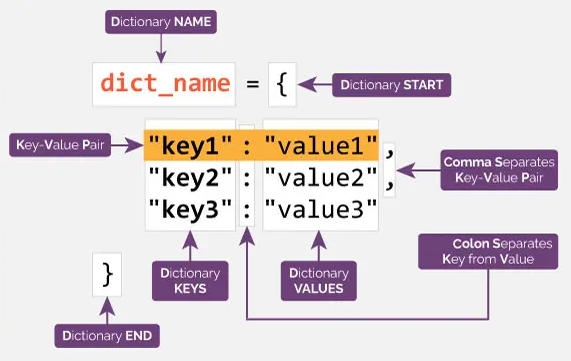Dictionaries
- Built-in data type.
- It is not a sequence.
-
A set of key: value pairs.

-
Indexed by keys.
- The
keyis case-sensitive. - We use a
keyto get values from a dictionary. -
They can be strings, numbers, tuples:
info = { "name": "Claudius Ptolemy", 100: ["Mathematician", "Astrologist", "Geologist"], ("Alexandria", "Egypt", "Roman Empire"): "Alexandria is the second largest city in Egypt and the largest city on the Mediterranean coast." }[!CAUTION]
If a tuple contains any mutable object either directly or indirectly, it cannot be used as a key.
- They have to be unique within one dictionary.
- The
Get a Value
-
getmethod:car = { "name": "BYD", "model_number": 123, "plaque_number": "px123" } print(car.get("name")) -
Key as index:
print(car['name'])
[!TIP]
getwill returnNonewhen it cannot find a value for the provided key whereas the key as index approach will raise an exception in case it did not find it in the dictionary.- Key as index is faster than
getmethod.- Sometimes we want our app to crash if the key was not present.
profile = { "username": "Genghis_khan" } print(profile["age"]) # raises an exception print(profile.get("age")) # returns None
- Get all keys like this:
info = { "name": "Claudius Ptolemy", "fields": ["Mathematician", "Astrologist", "Geologist"], "home_town": "Alexandria is the second largest city in Egypt and the largest city on the Mediterranean coast.", "died": 100 } keys = list(info) sorted_keys = sorted(info) print(keys, sorted_keys)
Delete a key-value Pair
-
You can use
del:me = {"test": 123} del me["test"] print(me) # {} -
You can also use
pop, note that this method returns the value of the deleted key:car.pop("name")And you can also specify a default value in case it did not exists in the dictionary.
car.pop("mileage", 0) # 0 will be returned if "mileage" does not exist in the car dictionaryNote that
popworks in LIFO (Last In First Out). BTW we have another method which returns both key and value for that key calledpopitem.
[!TIP]
delperforms better thanpop.
in Operator – Membership Test Operator
-
In dictionaries the
inoperator looks up for the keys:if "production_date" in car: print(car['production_date'])
[!NOTE]
The
inoperator in a sequence (e.g. an array) looks for that value’s presence in the sequence.names = ["Mohammad", "Jawad"] if "Alex" in names: print("Alex exists in the list")
Loop Over a Dictionary
-
You by default iterate over the keys:
for key in car: print(key) print(car[key]) # This is how you can get the values -
itemsmethod:for key, value in car.items(): # Unpacking print(key) print(value)
[!TIP]
- The
itemsmethod is more readable.- The
itemsmethod is more efficient.
Convert a List to Dictionary
-
enumeratefunction:arr = ["asd"] for key, val in enumerate(arr): print(key, val) -
Build dictionary directly from sequences of key-value pairs with the
dict()constructor:ai_figures = [("John McCarthy", 2011), ("Kate Crawford", None)] print(dict(ai_figures)) # Yet another way: print(dict(key1="value1", key2="value2"))
Dictionary Comprehensions
numbers = {number: "even" if number % 2 == 0 else "odd"
for number in range(1, 100)}
print(numbers)
setdefault Method
Instead of
account = {
"credit": 123
}
def top_up(account):
# TODO copy the object first
if "credit" not in account:
account["credit"] = 0
account["credit"] += 10
return account
You can do this:
# ...
account["credit"] = account.setdefault("credit", 0) + 10
return account
update Method
You can add key-value pairs of one dictionary to another by using this method:
user = { "name": "jawad" }
account = { "IBAN": "DE123456789012" }
user.update(account)
print(user)
Shallow Copy VS Deep Copy
-
copymethod does a shallow copy.user1 = {"schools": ["zoom"]} user2 = user1 # user2 = user1.copy() user2["schools"].append("elder") print(user1) print(user2)So basically these two objects are pointing to the same address of memory. It copies references and not the things it is referring to.
-
deepcopyhelper function incopymodule:from copy import deepcopy user2 = deepcopy(user1)
[!TIP]
A simple deep copy helper function:
def simple_deepcopy(obj): res = {} for key, value in object.items(): if value is Array: res[key] = value.copy() continue res[key] = value return res
fromkeys Method
- Creates a new dictionary from the given list.